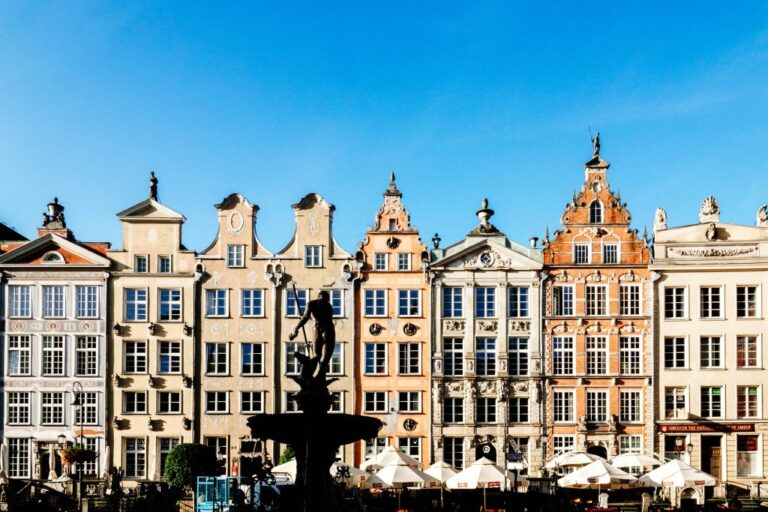Poland Digital Nomad Visa Your 2025 Application Checklist
Find out in this guide which is the most viable option to obtain your digital nomad visa for Poland. From the requirements to your application.
Strategically located in Central Europe, Poland offers an excellent quality of life and an advanced technological infrastructure, making it an ideal location for those working remotely. In recent years, with the boom in digital nomadism, Poland has established itself as an emerging destination for remote workers seeking a perfect combination of digital connectivity, cultural heritage and affordable living costs. In this article, we explain which visa will help you to establish yourself as a digital nomad in Poland.
Although Poland does not have a specific visa for digital nomads, there are options that allow these professionals to stay in the country while working for clients or companies abroad. The most viable alternative is the long-stay visa (Type D) in Poland. Here we tell you how you can obtain this visa to live your own experience as a digital nomad in Poland.
What is the temporary residence visa in Poland and how does it work?
The long-stay visa in Poland is one of the options that digital nomads can consider if they wish to settle in Poland for a longer period of time. Although not specifically designed for digital nomads, it offers the flexibility to live and work remotely from Poland.
This type of visa is applied for through the immigration offices in Poland and is intended for foreigners who wish to stay in the country for more than three months, provided that their stay does not exceed one year. The long-stay visa allows for a range of activities, including studying, working or living in Poland while working remotely for foreign clients.
Long-stay visas can also be requested for economic reasons or for the creation of a company. However, digital nomads who already have clients outside Poland and who do not need to work directly for Polish companies often find this visa a suitable solution to live in the country without legal complications.
Legal support for the long-stay visa for digital nomads in Poland
Interest in temporary residence visas from digital nomads has increased significantly in recent years, leading Poland to see this trend as an opportunity to boost its local economy and attract highly skilled international talent. Although no specific visa has been implemented for this group, the authorities have shown interest in improving conditions to facilitate the arrival of these professionals in the country.
Poland, as part of the European Union, also follows EU guidelines for visa management and labour mobility, ensuring that any changes in regulations are implemented in a manner consistent with the European framework. This development reflects Poland’s desire to become a competitive destination for digital nomads and remote professionals by offering a legal and attractive option within the long-stay visa framework.

Characteristics of the long-stay visa (Type D) in Poland
The long-stay visa in Poland offers a number of features that make it attractive for digital nomads. Let’s review its main benefits:
- Duration of stay: the long-stay visa allows foreigners to stay in Poland for a period of up to one year. This makes it an attractive option for those who wish to settle in Poland for more than 90 days.
- It allows multiple entries and exits: with this visa, you can enter and leave Poland as many times as necessary, which facilitates mobility within Europe and access to other Schengen countries.
- Possibility to work remotely: even if you do not consent to work for Polish companies without an employment contract, the temporary residence visa allows digital nomads to work for foreign companies or clients located outside Poland. This is perfect for those who already have a portfolio of clients or employers in other countries.
- Access to public services: long-stay visa holders can access a range of public services in Poland, including education and the health system. However, to obtain medical care, you must have private health insurance or be registered with the Polish public health system (NFZ).
- Opportunity to start a business: if you have an entrepreneurial spirit, this visa also allows you to start your own business in Poland. The requirements may vary, but digital nomads wishing to set up a business in Poland can do so through this visa.
- Stability and peace of mind: with this visa, digital nomads can enjoy the peace of mind of residing legally in Poland without having to worry about possible migration problems.
- Flexible requirements: unlike other visas that require strict employment requirements, the temporary residence visa in Poland is more flexible and open to a variety of professional situations, as long as you can demonstrate the ability to support yourself financially during your stay.
Important: If you are a frequent traveler and want to stay connected without worrying about expensive roaming or looking for a new SIM at every destination, Holafly’s subscription plans are for you. With a single eSIM, enjoy internet in more than 170 countries for a fixed price and no surprises on your bill. travel without limits and connect easily and securely! 🚀🌍

General requirements for applying for a digital nomad visa in Poland
To apply for a long-stay visa in Poland, digital nomads must meet a number of requirements that vary according to the type of activities they plan to carry out in the country. We list the most common requirements:
- Proof of sufficient financial means: one of the main requirements for obtaining a long-stay visa is to prove that you have sufficient financial means to support yourself during your stay in Poland. This may include proof of regular income through your remote work or savings in a bank account. A minimum amount is usually required to cover the costs of accommodation, food and medical insurance.
- Valid medical insurance: all applicants must have medical insurance to cover any eventuality during their stay in Poland. The insurance must be valid throughout the Schengen Area and have a minimum coverage of 30,000 euros for medical and hospital expenses.
- Criminal record certificate: depending on your country of origin, you may be required to present a criminal record certificate showing that you have no convictions for serious crimes. This document must be translated into Polish and issued by the competent authorities in your country.
- Proof of accommodation in Poland: to obtain a visa, you will also need to provide proof that you have a place to stay in Poland. This can be a lease contract or a letter of invitation from a host in Poland.
- Completed application form: the application form for the temporary residence visa must be completed online or in person, depending on the immigration office. It is important to ensure that all information is accurate and supported by appropriate documentation.
- Valid passport: your passport must be valid for at least six months beyond the duration of the visa you are applying for. In addition to this, you must have at least two blank pages for immigration stamps.
- Proof of purpose of stay: depending on the type of activity you plan to carry out in Poland, you will also need to prove the purpose of your stay. If you are a digital nomad, this may include remote work contracts, letters from clients or proof of regular income.
Documents to provide when applying for a digital nomad visa for Poland
To apply for a long-term visa in Poland, as a digital nomad you need to prepare a set of documents proving your ability to reside in Poland legally and sustainably. The documentation may vary depending on the specific case of each applicant, but in general, these are the basic documents you will need to submit:
- Completed application form: this is the main document and must be filled in accurately. It is available on the Polish government website and must be completed in the e-consulate system (e-konsulat.gov.pl), printed and signed. It is essential that the information provided is correct and matches the documents attached.
- Valid passport: as mentioned above, your passport must be valid for at least six months from the start date of the visa you are applying for. Also at least two blank pages for entry and exit stamps.
- Recent photographs: two passport-style photographs, in colour and with a light background, must be submitted. Specific dimensions and requirements are stipulated by the Polish authorities and must be strictly adhered to.
- Proof of financial means: you will need to present documents proving that you have sufficient financial resources to cover your stay in Poland. This may include bank statements, employment letters or contracts showing your monthly income. It is advisable to prove that your income is stable and sufficient to cover basic expenses.
- Valid medical insurance: the medical insurance must cover at least 30,000 euros for medical and hospitalisation expenses. It is essential that the insurance is valid in all Schengen countries, including Poland. It is available both in your home country and in Poland.
- Proof of accommodation in Poland: you will need to present documents proving that you have a place to stay in Poland during your stay. This may include a lease contract, a letter of invitation from a Polish host or a hotel reservation for the first months of stay.
- Criminal record certificate: depending on your country of origin, the authorities may request a criminal record certificate issued by your government. This document must prove that you have no convictions for serious crimes and must be officially translated into Polish if it is issued in another language.
Where can I apply for a digital nomad visa for Poland?
The application for a long-stay visa in Poland can be made either in your home country or in Poland, depending on the circumstances. Here we explain where you can apply and what options you have to apply.
- Polish embassies and consulates abroad: if you are outside Poland, the most common option is to apply for a visa through the Polish embassy or consulate closest to your place of residence. The forms and detailed instructions are available on the websites of the embassies and consulates. It is important to make sure that you comply with your country’s specific requirements, as these may vary.
- Immigration offices in Poland: if you are already in Poland on a short-stay visa, such as a tourist visa, you can apply for a long-stay visa directly at the Polish immigration offices. You must go to the Foreigners’ Office (Urząd do Spraw Cudzoziemców) in the region where you live to submit your application.
- Online portal: the Polish government has made it easier to access application forms through online portals, allowing you to complete the first part of the process before going to an immigration office or consulate in person. This speeds up the process and allows international applicants to start organising their stay before arriving in Poland.
- Visa application centres: in some countries, Poland cooperates with visa application centres that handle the initial formalities on behalf of the consulate. These centres are located in key cities, such as capital cities, and allow for a more efficient handling of visa applications. One of these world-renowned centres is VFS Global.

Where can I get tailored advice on the digital nomad visa in Poland?
Applying for a visa to temporarily reside in Poland can be a complicated process, especially if you are not familiar with the legal requirements and the Polish language. For this reason, many people choose to seek personalised advice to ensure that the whole process runs smoothly.
- Legal and migration consultancy companies: there are several companies that specialise in providing legal advice to foreigners wishing to move to Poland. These companies help applicants gather the correct documentation, fill in the forms and prepare for interviews at immigration offices. Some of the most recognised firms in Poland include Krakspire and ITS Poland. These companies offer services in several languages, including English and Polish.
- Online advice: many of these legal companies also provide online advice services. This is particularly useful for digital nomads who are not yet in Poland and wish to start the process from their home country. Through video calls or emails, these companies can guide you through every step of the process.
Frequently asked questions when applying for a digital nomad visa for Poland
These are some of the most frequently asked questions when applying for a long-stay visa in Poland for digital nomads.
The application process for a long-stay visa in Poland usually takes between one and three months, depending on the number of applications and how complex your case is. It is advisable to start the process early to avoid unnecessary delays.
Yes, it is possible to renew this visa as long as you continue to meet the requirements. Renewal must be applied for before the expiry of the current visa. And should you be asked for it, you will need to provide proof that you still meet the visa criteria.
Yes, you can include family members in your visa application. As long as you can prove that you have the financial means to support them during their stay in Poland. Family members must also have health insurance and meet the other requirements.
It is not compulsory to speak Polish to apply for a long-stay visa. However, having a basic level of the language can be useful during your stay in Poland. Especially if you plan to interact with the local administration or seek services in the country.
The cost of a long-stay visa in Poland varies, but usually ranges between 300 and 400 PLN. This amount may change depending on the specific visa category and the consulate where you apply.





 Language
Language 


















 No results found
No results found







